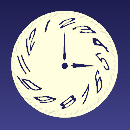

Dec 2018
Election to the CSD-N Board of Directors has concluded. The following people have been elected (or re-elected) to the board:
Nov 2018
Five candidates have volunteered to run for Circadian Sleep Disorders Network Board of Directors. All have been formally nominated by the current board. Two are incumbents: James Fadden, our vice president and a founder of the organization, and Lynn McGovern, our newsletter editor. The other three, Alexandra Wharton, Kalle Widell, and Kevin Williams, would be newcomers to the board.
There are four openings on the board, and the four highest vote-getters will be elected, so your vote counts! All dues-paying members current as of Nov 20 are eligible to vote, regardless of whether your membership expires in 2018 or 2019. Members should receive ballots by email, from BallotBin.com, on or about Dec 1. Voting closes on Dec 15. Results will be announced shortly after. New board members take office at start of the next regular meeting, which begins Jan 15, 2019.
The candidates have submitted statements supporting their candidacy. These are listed here.
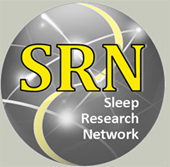 Oct 2018
Oct 2018
Our president, Peter Mansbach, was invited to participate in a panel discussion at the Sleep Research Network (SRN) conference in Bethesda, MD, October 29 - 30, 2018. There were about 50 people in attendance. The focus of the conference was cohort studies, which provided an opportunity to introduce our
registry and survey to the assembled research community.
The panel consisted of five industry representatives and Peter. Other patient reps were unable to attend. Rather than focusing only on circadian disorders, Peter spoke on behalf of all sleep patients by calling attention to the overlap among the various sleep disorders. Pigeonholing patients into having EITHER narcolepsy OR sleep apnea OR delayed sleep phase is likely to result in less satisfactory treatment.
In a separate segment of the program several researchers were asked to present a quick 90-second overview of their ongoing work. Peter introduced a few of the preliminary results from our survey data.
It is gratifying to see how many people are engaged in sleep research, including a number in circadian rhythm sleep disorders research.
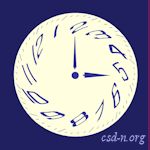 Oct 2018
Oct 2018
Circadian Sleep Disorders Network will be holding elections for its Board of Directors and is seeking some new faces. Requirements are described here. Meetings are held by online forum, so you can log in at any time of day to participate. These online meetings can continue for two months or more, since normally people log in no more than once a day to contribute to a discussion.
If you're interested, please email as soon as possible. Just send a short paragraph (preferably less than 300 words) about why you would like to serve, referencing any skills or experience that might be useful to us, such as writing, public relations, fundraising, law, accounting, healthcare, and non-profit experience.
In order to introduce the candidates to the voting members, your paragraph will be used in the newsletter sent out prior to the election, and on the election ballot. This election will be held online during the first two weeks in December, with current CSD-N members voting from the list of candidates. Directors start serving January 15, 2019.
We are also looking for volunteers. If you're interested, please send an email to the above address.
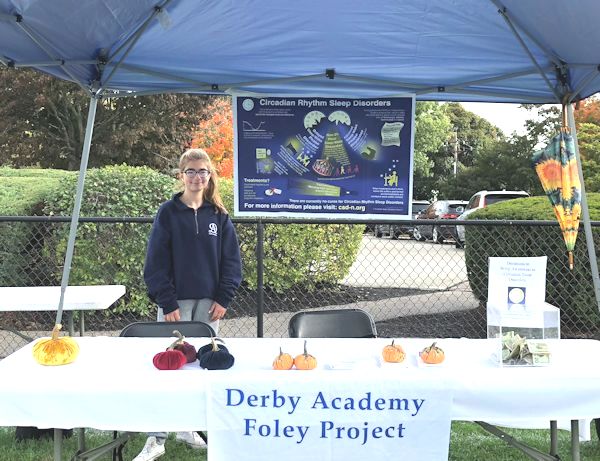
Oct 2018
Elizabeth McDougall, eighth grader and recipient of the Edward R.
Foley Citizenship Prize at Derby Academy in Hingham, Massachusetts, is
doing her community project on Circadian Rhythm Sleep Disorders. She
is spreading awareness of these disorders and raising money for
Circadian Sleep Disorders Network. Her interest springs from being
close to someone with Non-24-Hour Sleep-Wake Disorder and seeing how
difficult that disorder can be.
She set up a booth at their school's Fall Fair on October 13, 2018. She reports in part:
Despite the 47-degree temperature, rain, and wind, I was able to speak to quite a few people about circadian rhythm disorders and your organization. One woman has a brother who sleeps all day and is up all night, but has never had a sleep study. She took a brochure and will look for a doctor in his area and try to get him some help.Elizabeth will be raising awareness of our disorders and doing some fundraising during the school year. We are grateful for her help and look forward to further progress reports.
Oct 2018
Rockefeller University's Laboratory of Genetics is seeking participants for its ongoing study, Deciphering the Molecular Basis for Circadian Rhythm Sleep Disorders. The lab is researching changes in genes that can influence the internal clock that controls sleep timing. The goal of the study is to understand what makes some people sleep at times that are different from traditional hours.
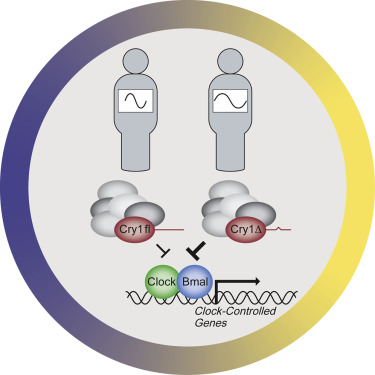 Last year, this lab, along with researchers in Turkey, discovered the CRY1 gene mutation in humans. It is one of the causes of Delayed Sleep Phase Disorder. This gene mutation causes carriers' body clocks to run longer than is typical - giving them the feeling of perpetual jet lag when they keep "normal" hours such as a 9 to 5 workday. Compared to non-carriers, carriers of this gene mutation experience nighttime sleep delays of 2-2.5 hours. "Carriers of the mutation have longer days than the planet gives them, so they are essentially playing catch-up for their entire lives," explains Alina Patke, a research associate in the lab.
Last year, this lab, along with researchers in Turkey, discovered the CRY1 gene mutation in humans. It is one of the causes of Delayed Sleep Phase Disorder. This gene mutation causes carriers' body clocks to run longer than is typical - giving them the feeling of perpetual jet lag when they keep "normal" hours such as a 9 to 5 workday. Compared to non-carriers, carriers of this gene mutation experience nighttime sleep delays of 2-2.5 hours. "Carriers of the mutation have longer days than the planet gives them, so they are essentially playing catch-up for their entire lives," explains Alina Patke, a research associate in the lab.
By accessing a database of sequenced genomes of people from around the world, researchers were able to interview those with the CRY1 mutation and confirm that they experience altered sleep patterns. It's the first time scientists concluded that a wide range of people with the CRY1 variant - who are NOT blood relatives - have the symptoms of a circadian sleep disorder.
Please consider participating. There is no cost to participate, nor is there any compensation. Participants do NOT need to be in the New York area - the lab work can be done remotely. Participants must be 18 or older.
If you are interested in participating, contact the research study lead, Dr. Alina Patke at patkea@rockefeller.edu. She will send you an informed consent form, a HIPAA form and schedule a phone call with you. During the call, you will have a chance to ask questions about the study. If you are interested in enrolling, you are required to sign the consent and HIPAA forms. Once you have returned these signed forms, you will receive a study questionnaire about your sleep, demographics and basic health; a sleep log for 14 consecutive days; and a saliva sample collection kit. After these materials have been sent in, the researchers may follow up with you by email or phone. You can decide to withdraw from the study at any time.
This is an experimental study. It is to contribute to research and is not for personal diagnosis; the results cannot be released to participants or their doctor. There is no direct benefit to participating in this study. Instead, participants may benefit in the future from what is learned in the study. From time to time, the lab will make available a summary of interesting or general findings from this project describing how they contribute to our understanding of sleep disorders.
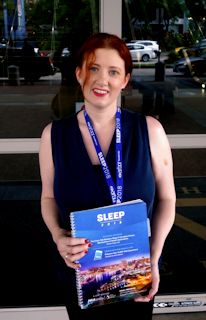 June 3-6, 2018
June 3-6, 2018
CSD-N board member Lynn McGovern attended the SLEEP 2018 conference in Baltimore June 3 - 6. This is the major sleep conference for sleep researchers in the U.S. Lynn lives in Ireland and is five hours ahead of us. She also has DSPD. However, thanks to the time difference, she was able to attend both morning and afternoon sessions. She focused her attention primarily on talks related to circadian disorders. Lynn has spent considerable time writing up some of these talks, so that those of us who couldn't make the morning sessions can
read about the conference and stay up-to-date on the research.
A brief excerpt from Lynn's conclusions: They also talked about the epidemic of sleep deprivation. Yet start times are changing only in schools. It seems nobody is connecting the dots and realising that work start times also need to change. There need to be large policy changes everywhere.
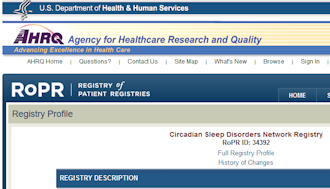 July 2018
July 2018
AHRQ, the Agency for Healthcare Research and Quality (within the U.S Dept of Health and Human Services) maintains detailed information on patient registries for use by researchers, as part of its Clinical Trials database. Circadian Sleep Disorders Network's registry and survey has now been added to their database, making it readily available to researchers seeking study subjects. Our entry has been posted. Anyone can search the entire Registry of Patient Registries (RoPR) at https://patientregistry.ahrq.gov.
And if you haven't yet: please REGISTER and TAKE THE SURVEY. The survey results will inform researchers about our situations and experiences, using de-identified data, and the registry allows researchers to request participants to contact them. (Your contact information is not given out unless you respond to their request, which is routed through the survey host, Invitae, using a de-identified ID number.)
We often complain that so little research has been done on the people suffering from Circadian Rhythm Sleep Disorders. One reason is the difficulty researchers have in locating people with these disorders. This is your chance! You can make a difference!
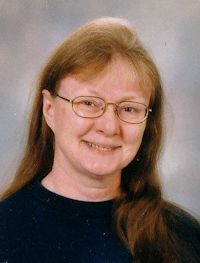 June 2018
June 2018
Beth Macdonald (Nina Beth on Facebook), one of the original founders of Circadian Sleep Disorders Network, and who passed away last year, has been recognized in an article in the Journal of Biological Rhythms for her work on the Wikipedia articles on circadian rhythms. Our vice president James Fadden has written a blog post quoting and summarizing relevant portions of the article and with some of the back story. Beth had actively maintained the Wikipedia articles on circadian rhythm, delayed sleep phase syndrome, non-24-hour sleep-wake disorder, and related topics, to be sure that the information was scientifically supported and to eliminate opinions belittling these disorders. James has volunteered to continue this maintenance.
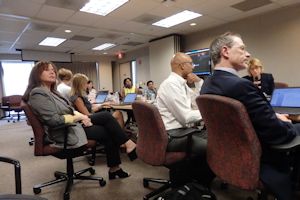 June 21-22, 2018
June 21-22, 2018
Susan Plawsky represented the circadian sleep disorders community at the NIH SDRAB (Sleep Disorders Research Advisory Board) on June 21 and 22. The SDRAB was fleshing out the new Sleep Research Plan, and Susan and the other three patient representatives did a great job pushing for greater emphasis on disorders (not just normal sleep) in the plan. You can read Susan's presentation here. CSD-N president Peter Mansbach, vice president James Fadden, and member Alexandra Escalera attended in the audience and spoke up in support. Peter also got the board to support adding information on circadian rhythm sleep disorders to the NIH web pages (that information is still not there).
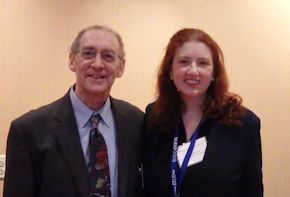
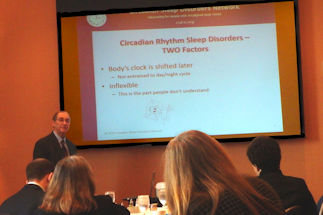 June 5, 2018
June 5, 2018
Board Member Lynn McGovern and President Peter Mansbach represented Circadian Sleep Disorders Network at the American Alliance for Healthy Sleep (AAHS) Sleep Advocacy Summit. AAHS is a recently formed offshoot of the American Academy of Sleep Medicine (AASM). This Summit brought together representatives of a number of patient advocacy organizations representing various sleep disorders. Peter gave a five minute introduction to Circadian Sleep Disorders Network, including definitions of our disorders and reference to our patient registry and survey (text, slides).
Lynn is also attending the AASM's annual multi-day SLEEP conference. Since she traveled from Ireland for the conference, her body was still on Ireland time and she was able to be up for morning talks despite her DSPD. She will report on that conference separately later.
June 5, 2018
The American Alliance for Healthy Sleep (AAHS) hosted a Sleep Advocacy Summit on June 5, 2018 during SLEEP 2018 in Baltimore, Maryland. This Summit provided an opportunity for the leadership of sleep advocacy organizations to meet, learn more about each organization, and discuss issues of importance to the entire sleep advocacy community. Thank you to all attendees for your time and participation and our sincere gratitude to all parties that contributed to the planning and success of the Summit.
In attendance at the Summit were 25 attendees from 9 organizations, including:
Each organization presented an introduction to their organization with information regarding current projects, success and challenges the group has faced. This allowed attendees to gain an understanding of each organization's purpose and activities, as well as the populations they serve....
It is clear that all the organizations present at the Summit passionately serve sleep disorders patients, whether individuals with a specific sleep disorder or across the entire spectrum of sleep disorders. While there may be overlap in terms of patients served, all organizations provide valuable, unique programs and services to sleep disorders patients.
Although some issues or needs are disorder specific, the Summit highlighted that increased awareness for sleep disorders, both in general and for each specific sleep disorder, is needed to increase awareness and detection of sleep disorders both with the general public, as well as segments of the medical community, such as primary care physicians. The opportunity exists for the various sleep advocacy organizations to work together to collectively spread greater awareness of sleep disorders.
May 2018
The General Data Protection Regulations (GDPR) took effect in the European Union, and covers our EU members. We have always repected our members' privacy, and our use of member data has not needed to change. We are clarifying our privacy practices, as required by the GDPR. These practices apply to all our members, not just those in the EU.
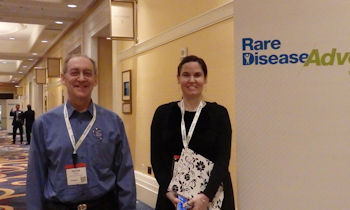 Apr 25 -27, 2018
Apr 25 -27, 2018
Board member Jennifer Silvia and president Peter Mansbach represented Circadian Sleep Disorders Network at the World Orphan Drug Conference at National Harbor, Washington, DC, on April 25 - 27. "Orphan Drugs" are drugs for rare diseases, which therefore are unlikely to have blockbuster sales and often go looking for a company to sponsor them: hence the "orphan" designation. As the conference title indicates, there were a lot of pharmaceutical companies represented. There is a lot of attention now on soliciting patient involvement in drug development, and we and other patient advocacy groups had been invited to attend.
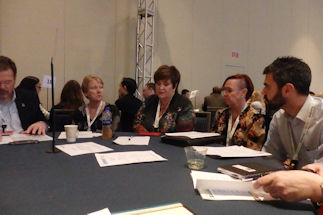 The most interesting sessions for me (Peter) were the four roundtable discussions I attended. In each one I was able to raise awareness a little by presenting information on our disorders tailored to each particular topic. Being a rare disease conference, our concerns were well received. For example, one discussion was Best Practices and Tips...to Tell a Rare Disease Story, and I emphasized the difficulty we have in getting an audience even to believe that we really can't fall asleep at a desired time no matter how tired we feel. For the Integrating the Patient Perspective I brought up how treatments have been based on lab measurements of melatonin onset, but we were more concerned with how tired we feel and how well we can function.
The most interesting sessions for me (Peter) were the four roundtable discussions I attended. In each one I was able to raise awareness a little by presenting information on our disorders tailored to each particular topic. Being a rare disease conference, our concerns were well received. For example, one discussion was Best Practices and Tips...to Tell a Rare Disease Story, and I emphasized the difficulty we have in getting an audience even to believe that we really can't fall asleep at a desired time no matter how tired we feel. For the Integrating the Patient Perspective I brought up how treatments have been based on lab measurements of melatonin onset, but we were more concerned with how tired we feel and how well we can function.
I attended a number of talks of interest. One was about patient registries for drug development. Among other things, these are useful for indicating the variability in people's experience with a particular disorder, and learning what endpoints (treatment goals) are important to the patients. [Aside: if you haven't yet, please join our registry and take the survey, to help jump-start research on Circadian Rhythm Sleep Disorders.]
One participant at the roundtable on real-world data used the term "free-range humans" to describe participants in a patient registry, because their answers may not hew to rigorous definitions of diseases or symptoms. I think I persuaded him of the value of registries like ours, to collect real-world patient data and to stimulate further research. I had a lot of support on this point from other participants.
I was again aware of how many of the activists in other patient advocacy groups are the parents of patients, since the patients themselves often don't have enough energy to pursue awareness and advocacy in addition to just surviving. With circadian disorders, we still often have difficulty persuading our parents that our disorders are real and serious, so we haven't seen enough such support.
Possibly the most useful interaction for me at the conference was a long discussion I had with a woman who works for Montgomery County, MD (where I live) helping small businesses. We discussed some of the issues that Circadian Sleep Disorders Network faces. She said she will refer me to a non-profit organization that helps other non-profits start and grow. This will be a long-term project.
 Feb 2018
Feb 2018
Our registry and survey is hosted by a health company that assures its privacy and security, and guarantees that it meets HIPAA (Health Information Portability and Accountability Act [U.S.]) requirements. This company was originally called PatientCrossroads, then changed its name to AltaVoice. Last year AltaVoice was bought by Invitae. Now they have switched the branding of the registry and survey to Invitae.
Your old links should continue to work. Our own website links have been redirected to the new site at invitae.com. Any previous survey answers have been carried over to the new site. Your login should continue to work. Let us know (at ) if you encounter any problems.
And if you haven't yet: please Take the Survey!
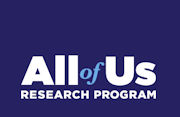 Feb 2018
Feb 2018
The (US) National Institutes of Health (NIH) is launching an unprecedented study, called All of Us, that will attempt to enroll a whopping one million participants from across the country. The goals:
The NIH wants input from all of us: which research questions should this vast study help answer? This is where we owls come in! We want more research on what makes our body clocks tick to the beat of a different drummer—and how to reset our clocks. We can also study sleep hours and habits, both for connections with other disorders and illnesses, and to attempt to get a handle on the incidence of CRDs.
Submit your research idea/s here: https://allofusresearchpriorities.ideascale.com/?new-idea=1
More info here:
Jan 2018
CSD-N's Board of Directors held elections for officers to serve for the next two years (through Jan 2020). The previous officers all agreed to run again, and no new people were nominated. The officers are:
Archived News 2017
Archived News 2016
Archived News 2015
Archived News 2014
Archived News 2013
Archived News 2011 - 2012 (incomplete)